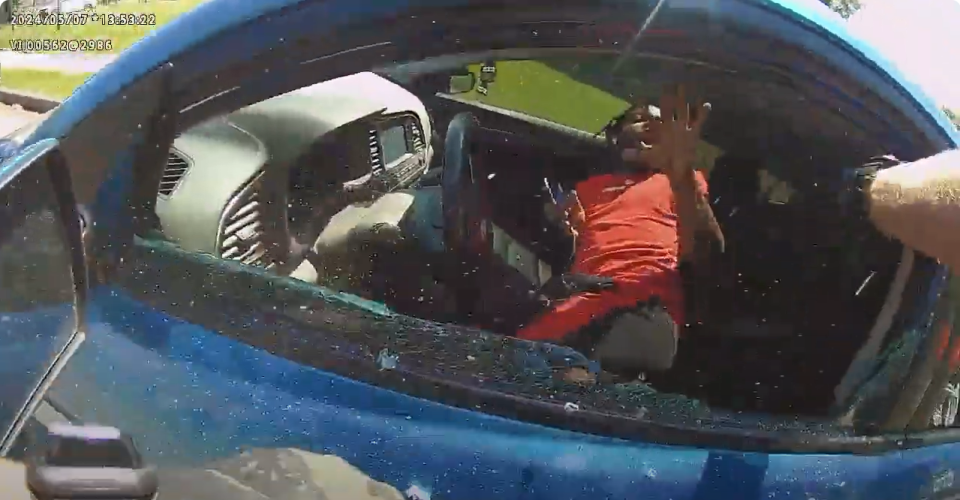A police officer orders you to exit your car during a traffic stop. Do you have to comply?
A recent incident has sparked debate over individual civil rights during a traffic stop. If a police officer orders you to get out of your car, do you have to comply?
The routine traffic stop in Rochester last month escalated when police smashed a man's car window and pulled him to the pavement. Rochester police said the forced removal of Marvin Taylor during the May 7 incident was necessary because he refused to exit his vehicle when ordered to do so by officers.
Taylor, a 22-year-old Black man living in Rochester, said he was hesitant to get out of his car because one of the officers had his gun drawn and police on scene wouldn't tell him why they pulled him over.
Later, Taylor found out he was stopped for an expired inspection sticker and because he allegedly didn't signal while making a turn on his way home.
So do you have to leave your car if police tell you to do so? The answer, settled in a 1977 U.S. Supreme Court case known as Pennsylvania vs. Mimms, is yes.

Do you have to get out of your car for police?
The Fourth Amendment to the U.S. Constitution protects individuals from unreasonable searches and seizures by the government. This means that to initiate a traffic stop in New York, police officers must have "reasonable suspicion" to believe that the driver has committed a traffic violation or another offense.
In the 1977 case, the U.S. Supreme Court ruled that police officers may order an individual out of their vehicle during a traffic stop because the person has already been lawfully detained ― albeit briefly. The court ruled that the officers' command would not violate the Fourth Amendment. It called such orders a minimal intrusion to the individual's personal liberty ― "a mere inconvenience" ― compared to the added safety it affords an officer.
"The driver is being asked to expose to view very little more of his person than is already exposed," the decision said. "The police have already lawfully decided that the person shall be briefly detained; the only question is whether he shall spend that period sitting in the driver's seat of his car or standing alongside it."
READ THIS: Tarnished reputations? Landlords say city’s scoring system is unfair, poorly managed
Do police have to give you a reason for a traffic stop?
While police must have a reason to initiate a traffic stop, in New York and most places there are no laws that require them to immediately tell you why you were pulled over.
Lawmakers in California, Connecticut and Minnesota are changing course, though.
In California and Minnesota, police must now provide reasoning for a traffic stop before they question drivers on any subject ― unless there is an imminent threat present. In Connecticut, police have until the end of the interaction to tell a driver why they were stopped.
Lawmakers in all three states said they were pushing for changes to promote equity and accountability in police patrols and limit pretextual stops, a technique where officers use minor infractions like a broken taillight as a gateway to search for evidence for unrelated crimes.
Research shows that Black drivers are more likely to be subject to pretextual stops than their white counterparts. In many cases, these traffic stops for minor infractions have turned combative or deadly for Black motorists.
More: Two traffic stops, two outcomes: Comparing Doorley and Taylor incidents
Scarlet Neath, policy director at the Center for Policing Equity, pointed to a 2023 study that found "in stops that end in force and other escalation, officers are more likely to begin with a command and less likely to explain the reason for a stop."
In advocating for the California legislation, the nonprofit Oakland Privacy argued that sharing the reason for a traffic stop can abate a driver's fear or panic during the situation.
"There is simply no reason not to do this," the group said in a statement to the Los Angeles Times. "The role of law enforcement is to enforce the law, not to play cat-and-mouse games to try to provoke people into doing the wrong thing and causing the encounter to spiral out of control."
What are your rights during a traffic stop?
The American Civil Liberties Union has published a guide to help people understand their rights when they are stopped by police. The guide also includes strategies for handling police encounters. Here is some of their guidance:
Stay calm and in control of your words, body language and emotions. Don't run and don't resist, even if you believe you are innocent.
If you are in the car, pull over, turn on the internal lights and open the window. Keep your hands where the police can see them. Upon request, show the police your driver's license, registration and proof of insurance.
If you are arrested, ask for a lawyer immediately. If you believe your rights were violated, write down everything you remember about the situation as soon as possible.
You have the right to remain silent and refuse to answer police questions. If you wish to exercise this right, it is best to say so out loud.
You do not have to consent to a search of yourself or your belongings, including your car. Refusing consent may not stop the officer from carrying out the search, but it could help preserve your rights in later legal proceedings. If you are arrested, your car will be subject to search.
— Kayla Canne reports on community justice and safety efforts for the Democrat and Chronicle. Follow her on Twitter @kaylacanne and @bykaylacanne on Instagram. Get in touch at kcanne@gannett.com.
This article originally appeared on Rochester Democrat and Chronicle: What are your rights during a traffic stop?

